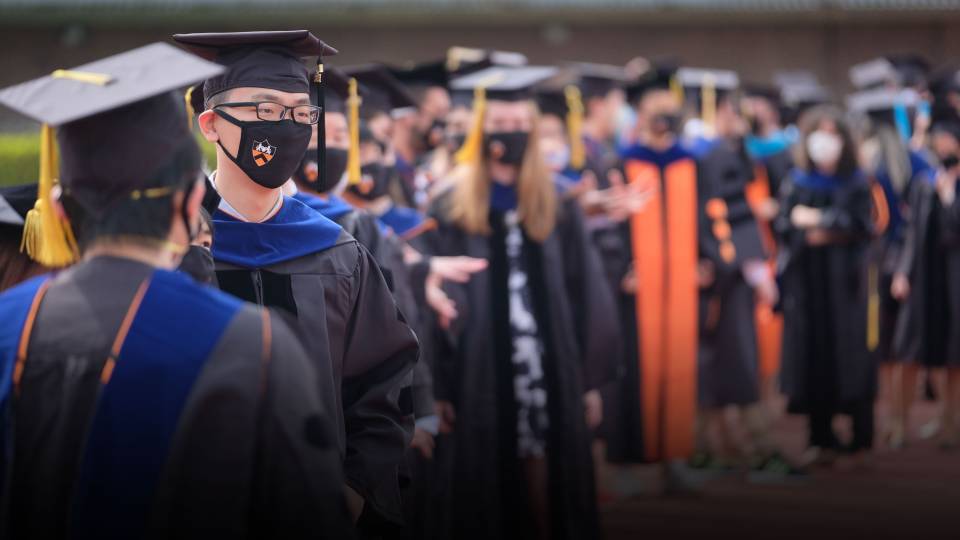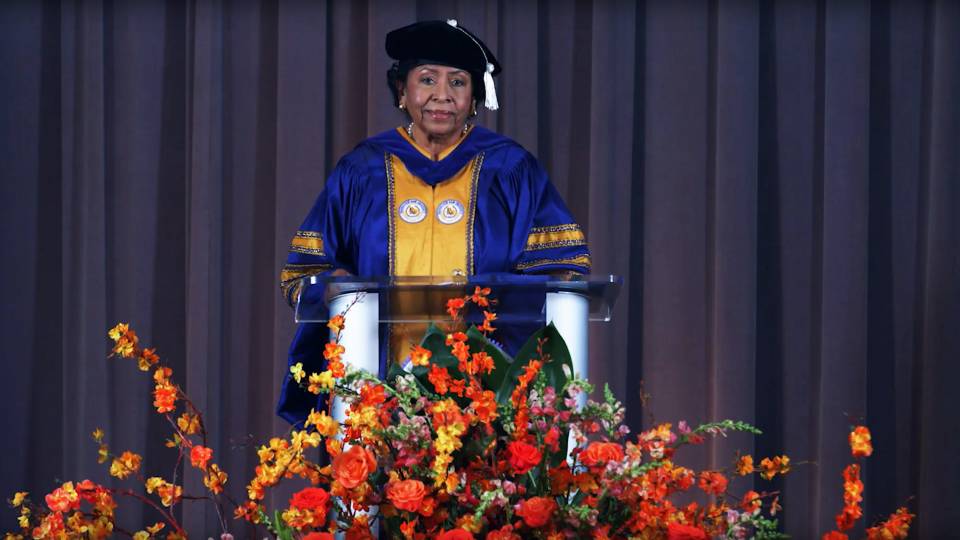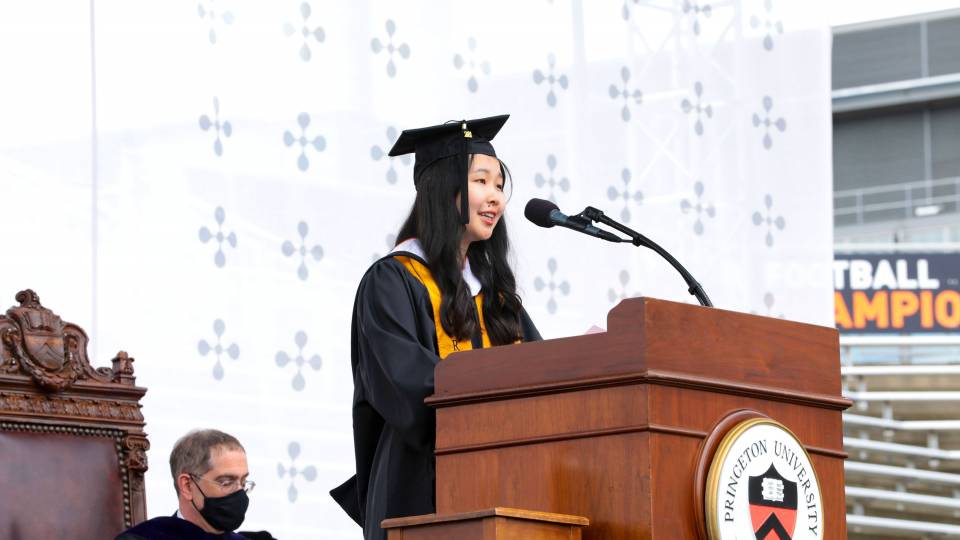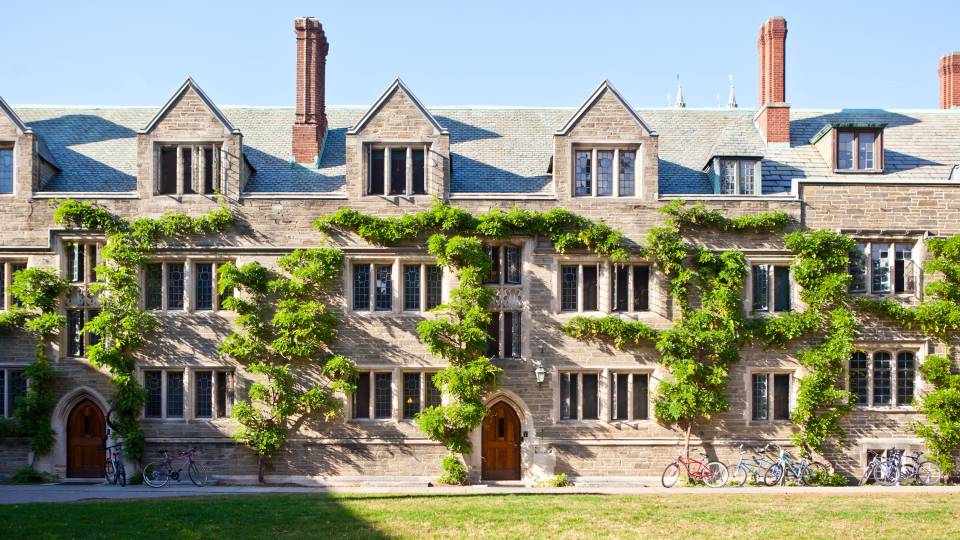Taishi Nakase, an operations research and financial engineering(Link is external) concentrator from Melbourne, Australia, has been selected as valedictorian of Princeton’s Class of 2021. Lucy Wang, a chemistry(Link is external) concentrator from Marietta, Georgia, was named salutatorian.
The Princeton faculty accepted the nominations of the Faculty Committee on Examinations and Standing at its April 26 meeting.
Commencement(Link is external) for the Class of 2021 will take place at Princeton Stadium on Sunday, May 16. Nakase and Wang are expected to give remarks at the ceremony.

Taishi Nakase
Taishi Nakase
Nakase plans to become a doctor and is interested in using mathematical modeling to confront global health challenges. After Princeton, he will pursue a master of science in modeling for global health at Oxford University before attending medical school.
“I was drawn to the program at Oxford because of its focus on mathematical modeling as a way of confronting challenges in global health,” Nakase said. “My research focus will be on the modeling of infectious diseases, particularly measles, in developing countries.”
Nakase is the first in his family to attend college. He credited the mentorship of Princeton faculty and research experiences through the Global Health Program(Link is external) with supporting his studies and inspiring his career path.
“Professor Bryan Grenfell introduced me to the world of infectious diseases and encouraged me as a first-generation college student to pursue my interests in the field,” Nakase said. Grenfell is the Kathryn Briger and Sarah Fenton Professor of Ecology and Evolutionary Biology and Public Affairs. “He has also tirelessly supported me in my independent work in infectious diseases by providing valuable insights and finding the time to help me think through the problems.”
Nakase’s senior thesis examines the modern challenges of measles control in Vietnam, modeling vaccination campaigns under limited health care resources in the country. Through Princeton’s Global Health Program, he interned with Dr. Marc Choisy at the Oxford University Research Clinic in Hanoi. Nakase continues to work with Choisy remotely on research modeling measles dynamics in Vietnam.
“My global health internship was a transformative experience,” he said. “It inspired a passion for the modeling of infectious diseases and encouraged me to pursue questions in global health.”
The course “Mathematical Modeling in Biology and Medicine,” taught by Associate Professor of Ecology and Evolutionary Biology Corina Tarnita, also had a profound influence.
“This class fostered a deep appreciation for mathematical modeling, particularly for its capacity to add structure and rules to systems whose governing forces remain largely hidden from view,” Nakase said. “It remains the principal lens through which I attempt to understand the spread and control of infectious diseases because it offers ways of constructing great complexity from seemingly simple structures. In this way, this class united my interests in modeling and medicine and thus inspired me to adopt a mathematical modeling approach to my future work in academic medicine.”
Nakase said Bill Massey, the Edwin S. Wilsey Professor of Operations Research and Financial Engineering, was also a valuable mentor and teacher. “Professor Massey was incredibly approachable and always delighted to spend time discussing his material with me,” he said.
Before heading to Oxford in the fall, Nakase will spend this summer studying questions pertaining to the persistence of measles in the developed world with Grenfell and Jessica Metcalf, associate professor of ecology and evolutionary biology and public affairs. In previous summers, he has been a trauma surgery research intern at the Wake Forest School of Medicine and a summer analyst at Rogers Investment Advisors in Tokyo.
While at Princeton, Nakase received the Class of 1939 Princeton Scholar Award and was twice awarded the Shapiro Prize for Academic Excellence. He is a member of the Phi Beta Kappa society and the Tau Beta Pi Engineering Honor Society.
In addition to his ORFE concentration, Nakase is pursuing a certificate in applications of computing. He is member of Mathey College(Link is external), as well as a teaching assistant for courses in ORFE, computer science and chemistry, and a mentor to incoming engineering students.
In recollecting his undergraduate experience, Nakase said the COVID-19 pandemic has put into perspective how special a place Princeton is.
“Last spring, amidst devastating loss and the upheaval of our studies and life, I came to reflect on how important the conversations with friends, whether in dining halls or in in-person discussions, were to our college life,” he said. “Hence, I am very grateful for the work of the University to bring us all together once again for this year’s Commencement on campus. To celebrate the joys and triumphs of our time at Princeton, especially our perseverance through the disruptions of this past year, with our classmates is truly special and a privilege for all of us who called Princeton home for the last four years.”
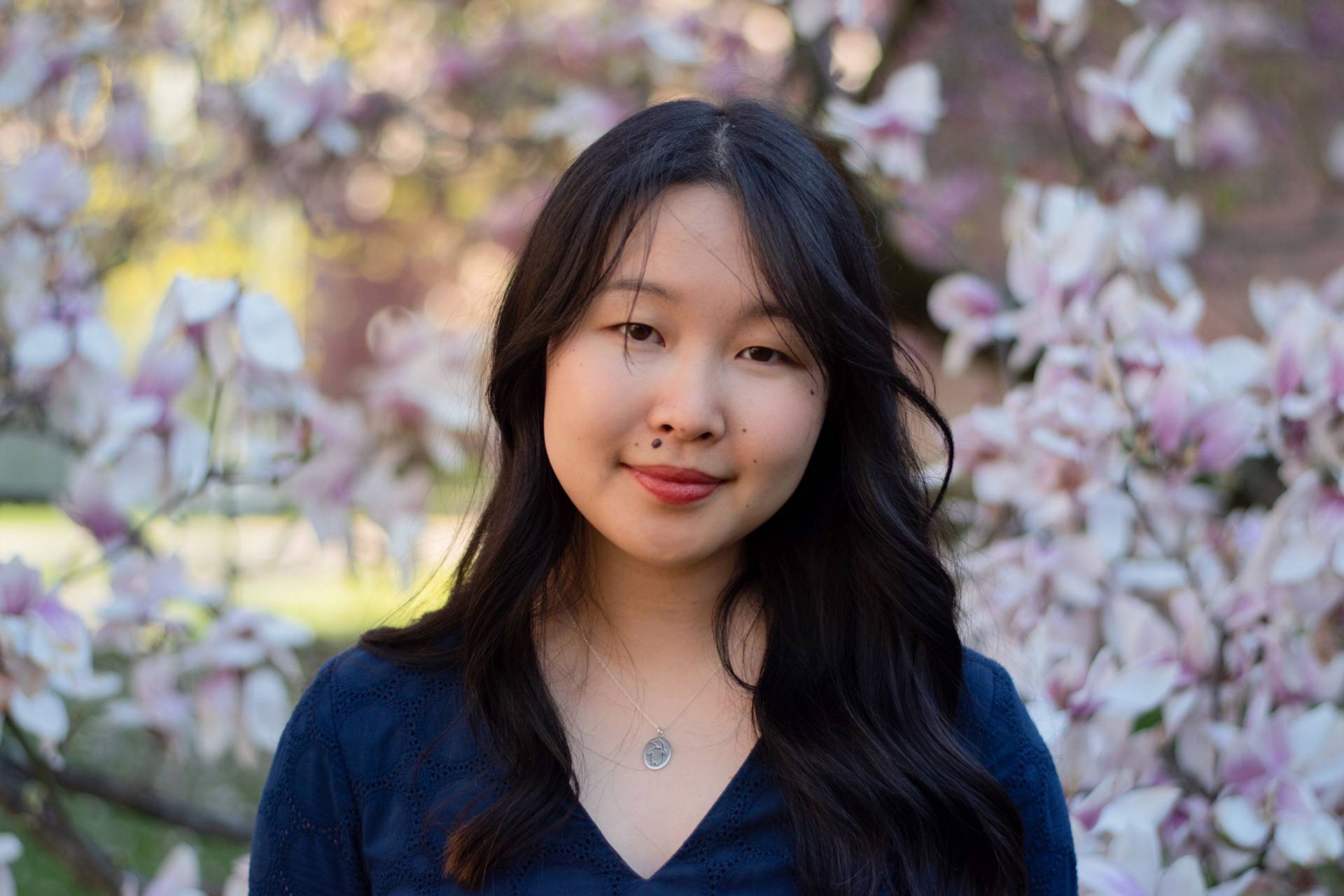
Lucy Wang
Lucy Wang
Wang’s studies at Princeton have been devoted to her dual interests in chemistry and classics(Link is external).
In addition to her concentration, Wang is pursuing a certificate in classics with a focus on Ancient Roman language and culture. The Princeton salutatorian address is traditionally given in Latin.
She plans to pursue a medical career and will start this fall at the Perelman School of Medicine at the University of Pennsylvania.
Wang said it was an organic chemistry class taught by Erik Sorensen, the Arthur Allan Patchett Professor in Organic Chemistry, that led her to concentrate in the department.
“His passion for organic synthesis and his enthusiasm for teaching left a deep impression on me,” Wang said. “Now, as a preceptor for his organic chemistry course, I see even more the care that Professor Sorensen displays for his students as a considerable portion of each weekly staff meeting is devoted to improving the course experience for students. It has been a treasure to learn from Professor Sorensen, who not only displays a vast understanding of the discipline, but also strives to make the field accessible for first- and second-year undergraduate students.”
While on campus, Wang has conducted research on transition-metal catalysis with chemistry faculty, including Abigail Doyle, the A. Barton Hepburn Professor of Chemistry, and Brad Carrow, a visiting research scholar in chemistry and associate professor of chemistry at the University of Houston.
Her senior thesis is advised by Doyle and is titled “A Data-Driven Approach Towards Exploring the Selectivity Space of Ni/Photoredox-Catalyzed Cross-Electrophile Couplings of Epoxides.”
“The computational efforts undertaken by this thesis and its contributions to elucidating a subtle mechanism for chemical selectivity provide a workflow for designing new catalysts and developing future asymmetric transformations,” Wang said.
Studying classics has also been an integral part of her Princeton experience.
“I am most impressed by the breadth of the classics department’s curriculum as well as the dedication of its faculty,” she said. “My time here at Princeton has led me to read works from not just canonical authors like Caesar and Vergil, but also lesser studied (at least at the undergraduate level) texts ranging from the comedies of Plautus to the moral epistles of Seneca. The faculty are wonderful scholars who are dedicated to teaching and inspiring intellectual growth. I recall in the class ‘Invective, Slander, and Insult,’ we were discussing two lines and their context in Roman law. The next week, Professor Haynes [a lecturer in classics] came to class with notes about that topic that she had spent her weekend researching in an obscure second-century legal corpus. I was impressed by the amount of care and commitment devoted to improving the classroom discussion.”
Wang is a member of the Classics Club and co-founded the Princeton Certamen, a Latin quiz bowl for high school students. With support from the Department of Classics, the event has grown to include more than 500 students from across the United States.
A member of Mathey College, she has won Princeton’s Shapiro Prize for Academic Excellence and has been awarded the Johnson & Johnson Pre-Professional Healthcare Scholarship. During the summer after her sophomore year, she interned through the Global Health Program in Perth, Australia, with a clinical trial that aimed to reduce the prevalence of skin infections in Aboriginal children living in remote communities.
Wang was co-editor of the Princeton Undergraduate Research Journal(Link is external), and a peer academic adviser and peer adviser for the Health Professions Advising office. She volunteers for a crisis textline and at Penn Medicine Princeton Medical Center.
In considering the Class of 2021’s graduation during the ongoing pandemic, Wang said the challenges of the last year will be remembered alongside the celebrations of the day.
“It cannot be stressed enough that the pandemic has magnified and aggravated the social, economic and racial inequities faced by marginalized communities. Some students have returned to homes with disruptive learning environments, and others have experienced the terrors of racial hate that continues to grip our nation. The pandemic has revealed the cracks in our support system and has illuminated areas where we need to do better and uplift the most vulnerable members of our community,” Wang said.
She added: “Although it is a joyous time to celebrate our achievements with our family, friends and faculty mentors, it is also important to remember that this Commencement is not just about us. This Commencement is possible only because of the efforts of healthcare professionals, essential workers, vaccine research scientists, and all the other people who have worked tirelessly and oftentimes thanklessly to keep our community safe and healthy. Although they might not be attending, we should keep in mind that we are enjoying the fruits of their labor as we celebrate Commencement in person.”
